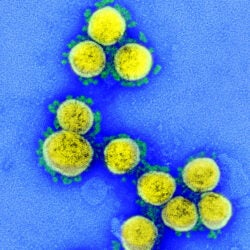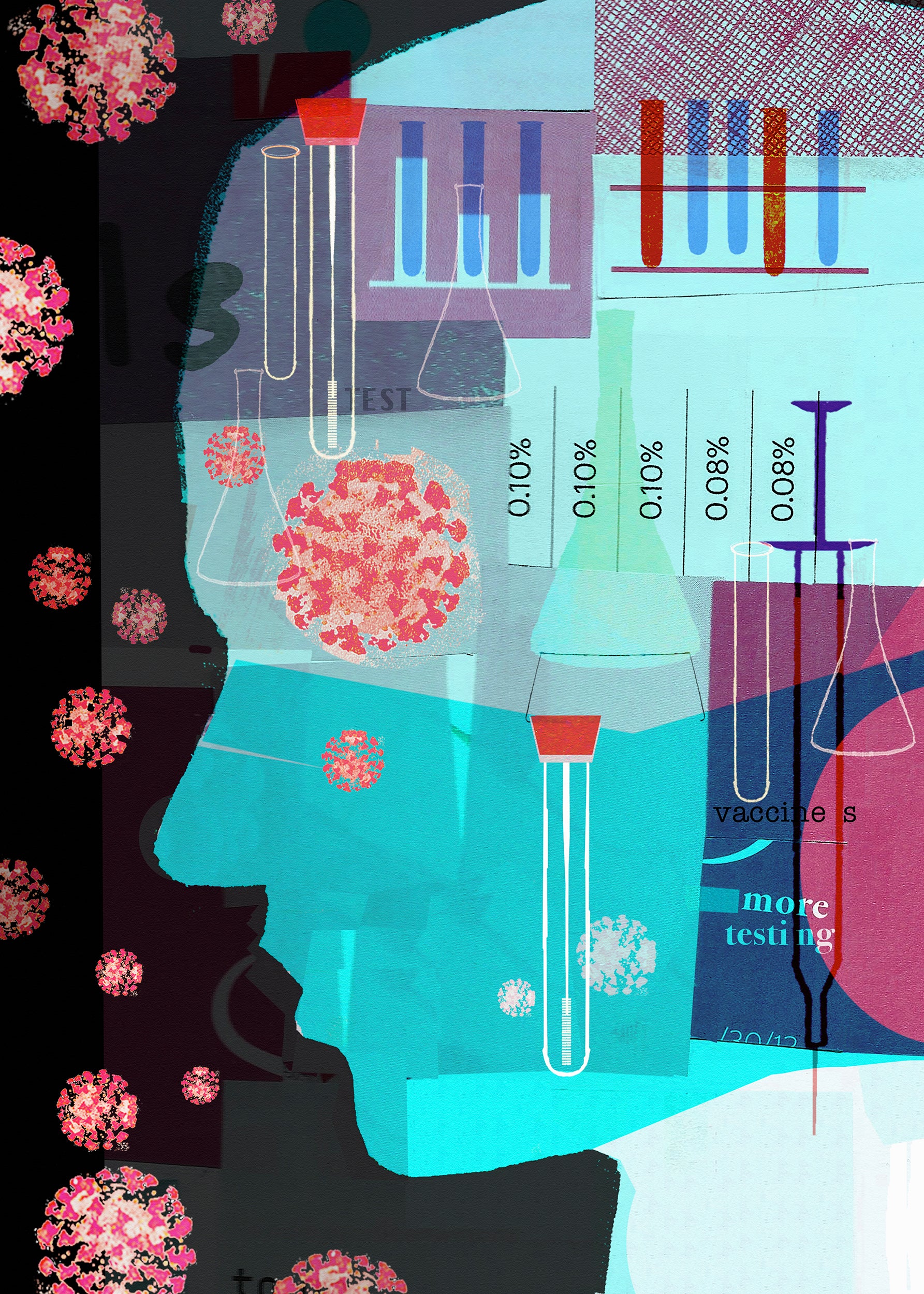
iStock
Anti-inflammatory drug improves survival in COVID-19 patients
Researchers have found that a targeted therapy with tocilizumab reduced mortality by 30 percent for critically ill COVID-19 patients when administered within the first two days of ICU admission.
Researchers from 68 sites across the country, led by David E. Leaf and Shruti Gupta from the Division of Renal Medicine at Harvard-affiliated Brigham and Women’s Hospital, have investigated the effects of the anti-inflammatory drug tocilizumab on critically ill patients with laboratory-confirmed COVID-19. Unlike steroids, which suppress the immune system more broadly, tocilizumab specifically inhibits the receptor for the pro-inflammatory cytokine, IL-6. The investigators found that when tocilizumab was administered within the first two days of intensive care unit (ICU) admission, there was a 30 percent relative decrease (and a 10 percent absolute decrease) in mortality compared to patients whose treatment did not include early use of tocilizumab. Results are published in JAMA Internal Medicine .
“Tocilizumab has been used for several years to treat a condition known as cytokine release syndrome, which can be observed in cancer patients receiving certain types of immunotherapy,” said Leaf, the senior author of the study. “In the setting of COVID-19, it has been observed that much of the morbidity and mortality that occurs may be due to our own body’s inflammatory response to the virus as opposed to the virus itself.”
The monoclonal antibody tocilizumab is currently approved to treat rheumatoid arthritis and giant cell arteritis, an inflammatory condition affecting large blood vessels. It is also administered to cancer patients who have received chimeric-antigen receptor therapy (CAR-T), a treatment that can stoke the body’s immune system to attack cancer cells but can also cause toxic side effects due to cytokine release syndrome (CRS), an overwhelming inflammatory response that can cause multiorgan failure. Tocilizumab is used to treat CRS in cancer patients and is currently under investigation for use in COVID-19 patients. Since the start of the pandemic, several tocilizumab studies have been conducted in Europe and China, but none this large or thorough.
The multicenter study utilized data accumulated from over 4,000 critically ill patients with COVID-19 admitted to ICUs at 68 sites across the U.S. as part of the Study of the Treatment and Outcomes in Critically Ill Patients with COVID-19 (STOP-COVID). STOP-COVID was initiated by Leaf and Gupta in March 2020 as an unfunded, grassroots network, and now includes over 400 collaborators across the U.S. These collaborators ascertained detailed data from critically ill adults with COVID-19 by manually reviewing electronic medical records and entering more than 800 unique data elements per patient into a centralized electronic database. For the current study, Leaf and his team used a “target trial emulation” approach to examine whether tocilizumab reduces mortality in COVID-19. Target trial emulation, a novel method of analyzing observational data, is the idea of simulating a randomized control trial to reduce bias.
“Discussions about the biases of observational studies tend to focus on lack of randomization, but many common biases of observational analyses have nothing to do with lack of randomization,” said co-author Miguel Hernán , pioneer of this technique and professor of biostatistics and epidemiology at the Harvard T.H. Chan School of Public Health. “Emulating a target trial using observational data allows us to eliminate those common biases and appropriately focus the discussion on potential confounding due to lack of randomization.”
Of the 3,924 patients included in the analysis, 433 received tocilizumab in the first two days of ICU admission. The risk of death at 30-days was 27.5 and 37.1 percent among tocilizumab-treated and non-tocilizumab-treated patients, respectively (absolute risk difference, 9.6 percent). The beneficial effect of tocilizumab on survival was consistent across categories of age, sex, and illness severity, and was also observed in patients who either did or did not receive corticosteroids. Notably, patients with a more rapid disease trajectory, defined as three days or fewer from symptom onset to ICU admission, benefited from tocilizumab to a greater extent than patients with a slower disease trajectory.
“I think the single most important thing we can do with the large and granular database that we assembled in STOP-COVID is to evaluate which interventions are helpful in reducing death,” said Leaf. “Obviously, randomized clinical trials are the gold standard for determining treatment efficacy, but when data from large, well-designed trials aren’t available, observational studies like STOP-COVID can be used to help guide clinical practice as well as the design of future trials.”
Despite the observational design, this study provides crucial and robust data on tocilizumab efficacy and safety in a large population of critically ill patients with COVID-19. On average, there was a 30 percent relative reduction in mortality for patients treated with tocilizumab in their first two days of ICU admission, there were no signs of increased risk for secondary infection, and there was only a small increase in risk of liver function test abnormalities.
“Though there are conflicting data from clinical trials regarding the efficacy of tocilizumab in COVID-19, our study differs from these trials in several important ways: we specifically focused on critically ill patients; we focused on early use of tocilizumab (defined as the first 2 days of ICU admission); and we included a much larger number of patients (approximately 4,000 compared to approximately 400),” said Gupta, the lead author. “We hope that our findings stimulate further investigation of tocilizumab in COVID-19, particularly as we are seeing cases rise across the country.”
In their analyses, the investigative team controlled for a comprehensive list of covariates, such as age, sex, race, ethnicity, comorbidities, acute severity of illness, and concurrent treatments received. They excluded patients who would not have been eligible to participate in a hypothetical randomized clinical trial of tocilizumab, such as patients with elevated liver function tests. They also used methods to eliminate the potential for immortal time bias, which can occur when there is a delay between time zero (e.g., admission to the ICU) and initiation of treatment (e.g., receipt of tocilizumab on ICU day 2). The main limitation of the study is potential confounding due to the observational design.
“I hope that these findings will help inform the design of future, well-powered clinical trials assessing early use of tocilizumab in critically ill patients with COVID-19,” said Leaf. “However, given the cost and complexity of performing large-scale clinical trials in COVID-19, the current study may be the best available evidence we have for tocilizumab in this setting for quite some time.”
No funding was provided for this study. The authors of the writing committee are supported by the following grants from the National Institutes of Health: F32HL149337 (A.J.A.); K23DK120811 (A.S.); R01HL085757 (C.R.P); R01HL144566 and R01DK125786 (D.E.L.); K12HL138039 (J.D.); K23HL130648 (K.S.M.); R37AI102634 (MAH); F32DC017342 (S.G.); K08GM134220 and R03AG060179 (S.S.); K23HL143053 (M.W.S.).


